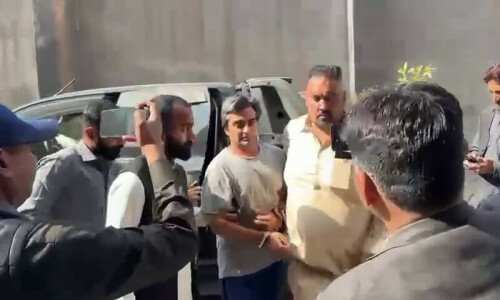ISLAMABAD: In 2013, Pakistan became “a more and more dangerous country” for religious minorities, “grew increasingly intolerant of dissent” from journalists and struggled with strategies to tackle threats such as militant extremism and intolerance, according to a report on the ‘State of Human Rights in 2013’.
Launched by the Human Rights Commission of Pakistan (HRCP) on Thursday, the report takes stock of Pakistan’s performance in the realms of legislation, justice, law-enforcement, the ensuring of fundamental rights and individual freedoms, as well as the status of vulnerable groups, such as women, children, religious minorities, the underprivileged and refugees, among others.
In the section on freedom of religion, the report notes that sectarian violence claimed a total of 687 lives in 2013. Seven Ahmadis were killed in pre-mediated attacks, Christian settlements and churches were targeted and a total of 39 people (including Christians, Hindus and Muslims) were charged with blasphemy in the entire year.
“Militancy has a major role to play in extremism. Now different sects have become increasingly intolerant towards each other,” said the Secretary General of Human Rights Commission of Pakistan, Mr I.A. Rehman, at the launch of the report.
The press grew increasingly unsafe last year and, as the report notes, 11 journalists were killed and scores more injured in the line of duty. In addition, those responsible for these heinous crimes remained at large.
The gruesome reality of terrorism in Pakistan and its terrible repercussions are also discussed throughout the report under different sections. Terrorists undermined the law and order situation, killing 694 people in 45 suicide bombings and kidnapping hundreds more; threatened citizens’ right to assembly with attacks on congregations and funerals; and challenged the fundamental freedom of association by hounding NGO and aid workers as well as targeting political workers in the run up to the general elections.
Spread over nearly 350 pages, the report paints a gruesome picture of the status of human rights and their abuses in the country. It recounts the killing of 200 Hazara Shias in Balochistan, the alleged extrajudicial killings of over 500 suspects at the hands of police and the discovery of 129 mutilated bodies of suspected missing persons, among hundreds of other examples. But, talking to the audience at Thursday’s launch event, Mr Rehman said he was more worried about the bigger picture.
“Over the years there has been no indication of a comprehensive plan of action or concrete approach to improve the state of human rights in the country,” he said.
This sentiment is echoed by the report, which notes with alarm how the strategy to deal with these serious crises – employed by both this government and the previous one – often amounted to “kicking the can down the road”.
The report sourced its data from surveys, fact-finding reports, official documents as well as clippings from 18 English and Urdu newspapers, in addition to input from HRCP field officers and private citizens across the country.















































